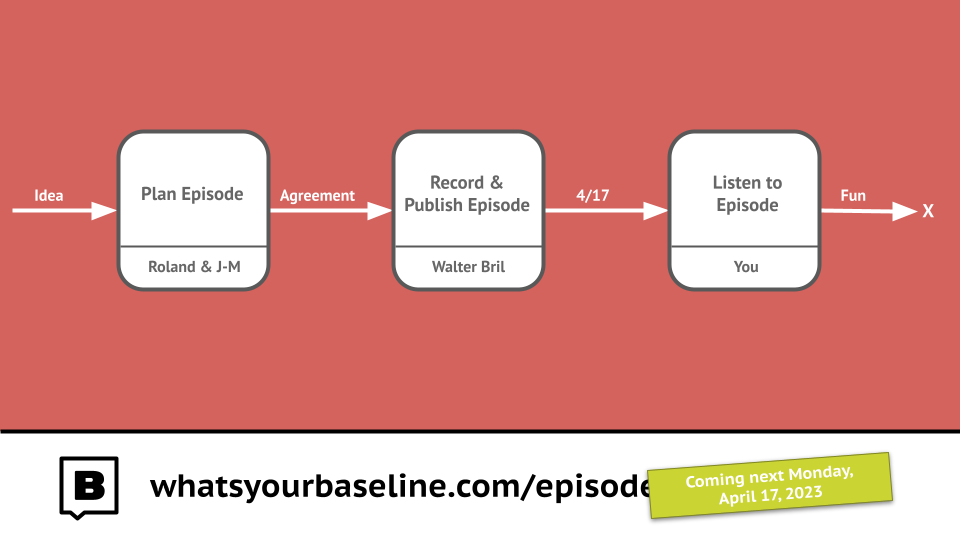Episode 44 – Process notations (and why they are not important): Walter Bril
When starting with process management one of the first questions is “what process notation shall I use”. In this episode of the What’s Your Baseline? podcast we discuss this question with Walter Bril, who is one of the co-inventors of the Universal Process Notation (UPN) and why it is not *really* important what notation you should use … it is more important which approach to Business Process Management you choose.

Walter has a strong process knowledge management background, combined with skills and experience in technology management for more than 20 years. Involved in and contributed to the field of practical process knowledge preservation. As you will hear, he has a no-nonsense approach and a unique and practical way to involve and motivate people regarding process knowledge management, process thinking and creating awareness.
Besides nerding out on process notations, he spends more time in the interesting developments around the Bitcoin protocol and public blockchain. Particularly in the context of social developments, concerns regarding the sustainability of traditional thinking models, and the socio-economic potential that a public blockchain has to offer. The combination “process-nerd” and blockchain evangelist is particularly valuable in this (oh, and he is the co-author on two books on this topic as well).
In this episode of the podcast we are talking about:
- Walter’s background
- The UPN notation and the 5 questions you should ask when modeling a process
- The “why” behind all this
- How to implement a new notation/approach in an organization
- How to convince people
- What is the “now what” then?
You can reach Walter on LinkedIn or by sending him an email to walter@elements.cloud.
Please reach out to us by either sending an email to hello@whatsyourbaseline.com or leaving us a voice message by clicking here.

Ep. 44 – Process Notations (And Why They Are Not Important): Walter Bril – What's Your Baseline? Enterprise Architecture & Business Process Management Demystified
Additional information
- I mentioned that Japan gave the cherry trees as a gift to Washington, DC in the 1930s … I stand corrected – it was 1912: https://en.wikipedia.org/wiki/National_Cherry_Blossom_Festival
(Photo below by Debojyotilahiri – Own work, CC BY-SA 4.0, https://commons.wikimedia.org/w/index.php?curid=51338099)

- We discussed process notations, frameworks, and reference content in episode 5 of the podcast – you can find it here: whatsyourbaseline.com/episode5.

- Michael Hammer’s book “Beyond Reengineering“
- IDEF0: https://en.wikipedia.org/wiki/IDEF0
- Walter mentioned one of his articles on LinkedIn – find it here: https://www.linkedin.com/pulse/why-business-process-management-bpm-doesnt-work-you-walter-bril/.
- We didn’t speak about it, but if you want to see an example of UPN, Ian Gotts has created a nice video where he takes a process from a Ryan Reynolds ad and models it in that notation. Enjoy.
Credits
Music by Jeremy Voltz, www.jeremyvoltzmusic.com
- CP1 (Welcome)
- Jetstream (Interlude 1)
- Be Loved In Return (Interlude 2)
- South Wing (Outro)
Roland Woldt is a well-rounded executive with 25+ years of Business Transformation consulting and software development/system implementation experience, in addition to leadership positions within the German Armed Forces (11 years).
He has worked as Team Lead, Engagement/Program Manager, and Enterprise/Solution Architect for many projects. Within these projects, he was responsible for the full project life cycle, from shaping a solution and selling it, to setting up a methodological approach through design, implementation, and testing, up to the rollout of solutions.
In addition to this, Roland has managed consulting offerings during their lifecycle from the definition, delivery to update, and had revenue responsibility for them.
Roland is the VP of Global Consulting at iGrafx, and has worked as the Head of Software AG’s Global Process Mining CoE, as Director in KPMG’s Advisory, and had other leadership positions at Software AG/IDS Scheer and Accenture. Before that, he served as an active-duty and reserve officer in the German Armed Forces.
